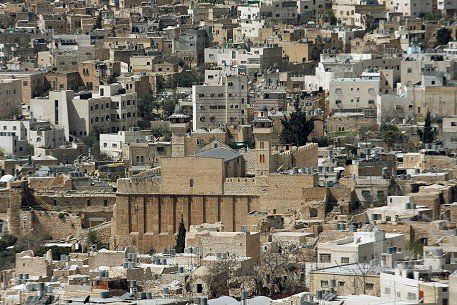Ma'an News
 |
Bethlehem - Ma'an - Israel has added two holy sites in the occupied West Bank to a list of national heritage sites, Israeli Prime Minister Benjamin Netanyahu announced on Sunday. Within his "Plan to Rehabilitate and Strengthen Israel's National Heritage Infrastructures," the upgrade affects Hebron's Ibrahimi Mosque, known to Israelis as the Cave of the Patriachs, and Rachel's Tomb in Bethlehem. An existing list already includes 150 Israeli locales, but the move to upgrade two located in the West Bank cities of Hebron and Bethlehem as Israeli heritage sites is unusual because neither are found in Israel. Renovation projects are tipped to cost 400 million Israeli shekels (approximately 110 million US dollars). 'An act of aggression against cultural and religious rights' Palestinian Authority officials immediately condemned the initiative. "This announcement is an act of aggression against the cultural and religious rights of the Palestinian people," said Dr Hamdan Taha, director of the PA Tourism Ministry's antiquities department, in a telephone interview. "Instead of making use of heritage to promote peace, it is being used as a means to promote war," Taha said, maintaining that the proposal's timing could not be discounted: "This is clearly intended to obstruct the peace process." Also noting that the shrines in question are holy to many faiths, Taha insisted that Netanyahu's plan to designate them as Israeli heritage sites "reflects an artificial history that solely serves Israel's settlement policy." He concluded that "a religious shrine respected by Muslims, Christians, and Jews should be respected as a cultural and religious symbol, not as an opportunity to obstruct international efforts to reach a peace agreement." Local officials in Hebron, meanwhile, blasted Netanyahu over the decision. Fatah declared a general strike for Monday, while Hebron's mayor, Kahled Al-Eseili, called on UNESCO to move quickly "to protect the Ibrahimi Mosque, prevent its desecration, and act against alterations to its features." International law, including the Hague conventions, oblige the occupier not to change the historical heritage of the occupied, he said. Al-Eseili called the announcement indicative that Netanyahu is "obsessed with obstructing the peace process, which is pushing the region toward an explosion." He said the prime minister "continues to impose reality by force." The mayor also said Netanyahu "is keenly aware that this mosque is held in high regard by every Arab and Muslim citizen," thus actions taken against it represent "an embodiment of inhumanity." He also said that, by any standard, the move restricts freedom to worship. The left-wing Israeli party Meretz also slammed the decision. "This is another attempt to blur the borders between the State of Israel and the occupied territories," Meretz party chairman Chaim Oron told the Hebrew-language daily Yedioth Ahronoth. "All it needs is a bit of pressure from the right, and Netanyahu falls into line. This decision puts Netanyahu's Bar-Ilan [University] declaration of two states for two peoples in an absurd light," Oron added, according to the newspaper. Israeli existence anchored in 'national and emotional legacy' The two Palestinian sites were added following pressure from Israel's far right. According to the settler-run news agency Arutz Sheva, a petition calling for Joseph's Tomb in Nablus to be included on the list has received over 1,000 signatures, among them Knesset members. Netanyahu defended the plan in remarks at his government's cabinet meeting on Sunday. "Our existence here in our country depends not only on the strength of the IDF and our economic and technological might. It is anchored, first and foremost, in our national and emotional legacy, which we instill in our youth and in the coming generations," Netanyahu said. "It depends on cultural heroes and national symbols. It depends on our ability to recognize and explain the justice of our cause, and to underscore our links to the land, first and foremost, to ourselves as well as to others," the Israeli prime minister added. Sunday's announcement follows last week's approval of a plan to build two heritage "trails" of archeological sites that snake through Israel and the West Bank. One path, which begins near the Al-Aqsa Mosque compound in occupied East Jerusalem, is a "trail of the Israeli experience that joins the main sites which relate the history of a people's return to its land," Netanyahu announced on Sunday. |